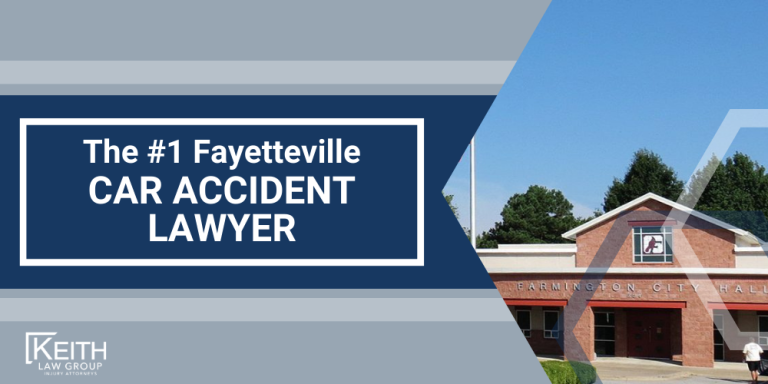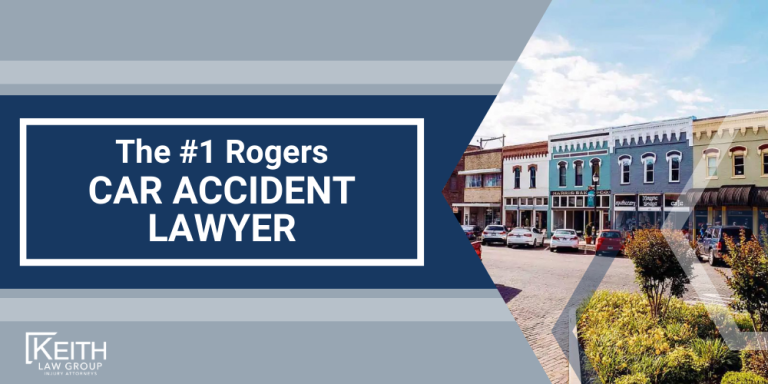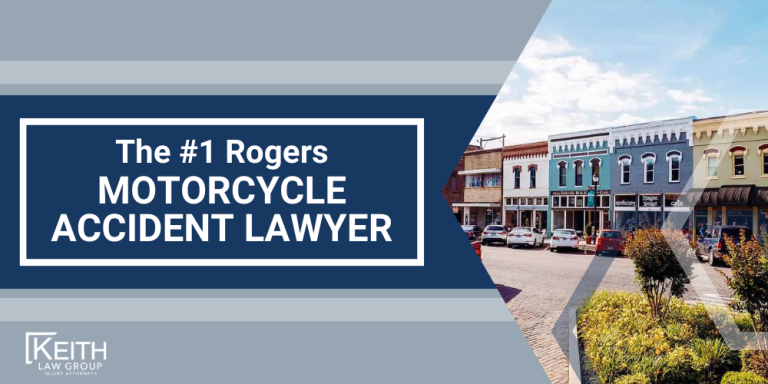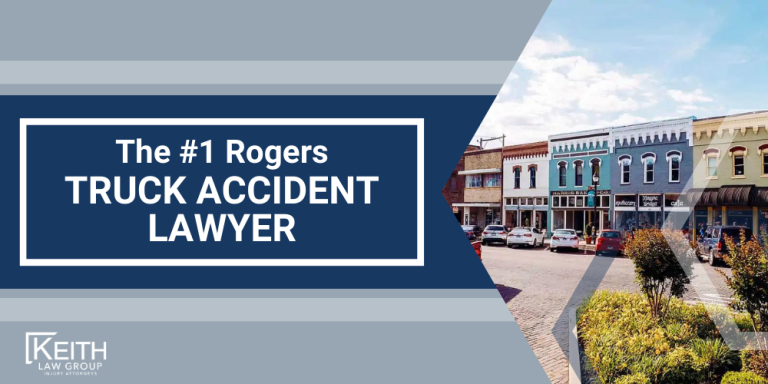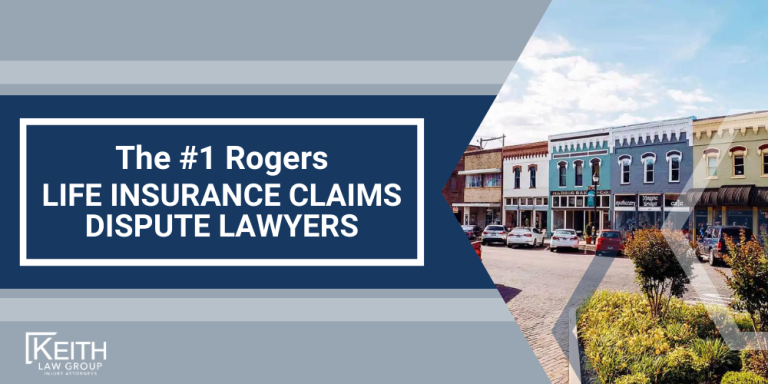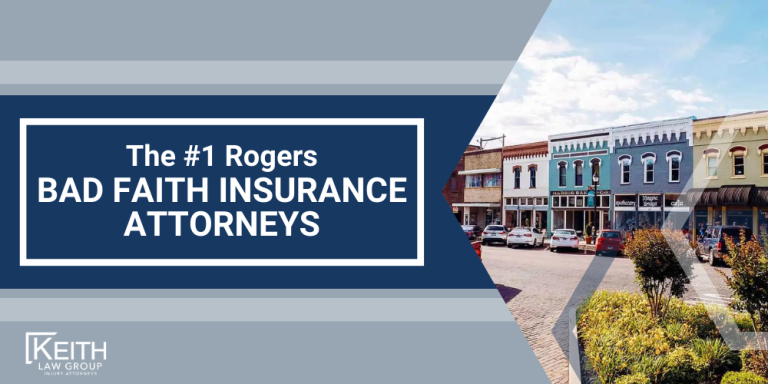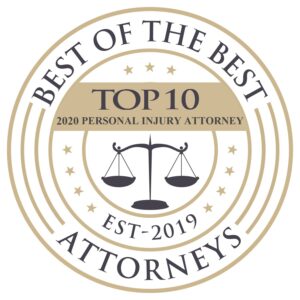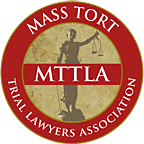- Last Updated: October 20th, 2025

Attorney Sean T. Keith has been a personal injury lawyer for 30+ years, a nationally recognized Top 100 Trial Lawyer, and top car accident lawyer & motor vehicle accident lawyer in Arkansas.
Legally Reviewed
This article has been written and reviewed for legal accuracy and clarity by the team of writers and attorneys at Keith Law Group and is as accurate as possible. This content should not be taken as legal advice from an attorney. If you would like to learn more about our owner and experienced injury lawyer, Sean T. Keith, you can do so here.
Fact-Checked
Keith Law Group does everything possible to make sure the information in this article is up to date and accurate. If you need specific legal advice about your case, contact us. This article should not be taken as advice from an attorney.
Sean Keith's Accollades & Practice Areas He Specializes In
- Over $20 Million recovered in Medical Device Injury Lawsuits.
- Over $13 Million recovered in Car Accident Lawsuits and other Motor Vehicle Accident Lawsuits.
- Over $100 Million recovered in total on behalf of clients.
- Sean represents clients in cases involving personal injuries, car accidents, motorcycle accidents, truck accidents, wrongful death, slip and falls, nursing home abuse cases, nursing home elopement cases, and more.
Were You Injured in a Car Accident in Rogers, Arkansas (AR)? Contact Keith Law Group Today
Were you injured in a car accident in Rogers, Arkansas?
Contact an experienced Rogers car accident lawyer from Keith Law Group at (479) 326-7734 if you have been injured in a car accident in Rogers, Arkansas (AR) at no fault of your own.
You can also use our website chat for a free instant case evaluation.
A car accident can dramatically disrupt your life, leaving you with serious physical injuries, emotional trauma, and overwhelming financial challenges.
Our dedicated team of Rogers car accident lawyers at Keith Law Group are committed to guiding you through the personal injury lawsuit process to help you recover the full compensation you deserve.
On this page, we’ll discuss the role of a Rogers car accident lawyer, how an experienced car accident attorney from Keith Law Group can help you secure maximum compensation for your injuries, the process for filing a car accident claim in Arkansas, and much more.
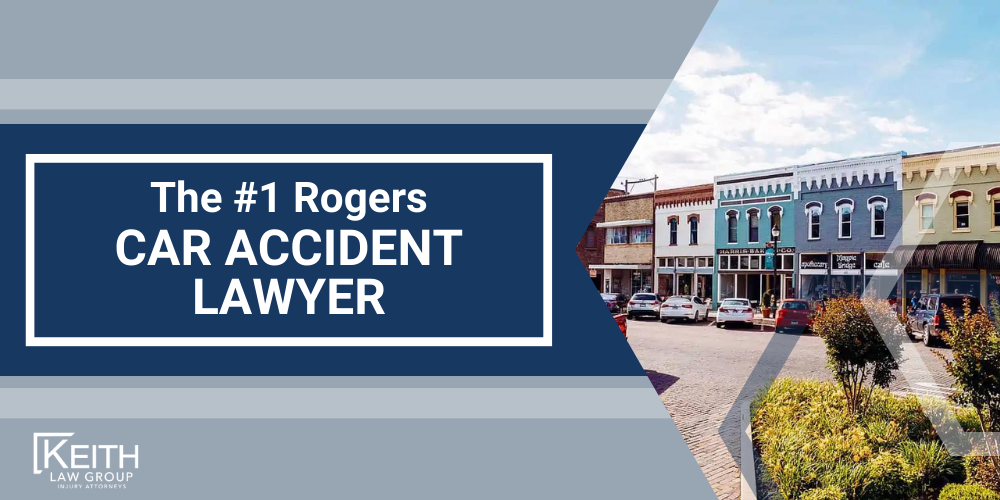
Our Rogers Car Accident Lawyers are Prepared to Help You
With a proven track record of securing significant settlements and verdicts for our clients, we are committed to holding negligent parties accountable for the harm they have caused.
Our Rogers car accident attorneys provide personalized, compassionate legal representation tailored to meet the unique needs of each client.
Whether you’re facing mounting medical bills, lost income, or the emotional toll of a serious injury, we are here to fight for your rights and help you on the road to recovery.

To speak with one of our Rogers car accident lawyers, call (479) 326-7734 or use the chatbot on this page for an instant case evaluation.
Contact Keith Law Group today for a free consultation, and let us help you take the first step toward recovery.
We understand the overwhelming stress and uncertainty that follow a car accident, from dealing with insurance companies to managing medical bills and missed work.
Our team is not only experienced in protecting your legal rights and best interests, but we are also sensitive to the emotional and physical challenges you may be facing.
If you’ve been injured in a car accident at no fault of your own, reach out to the Rogers car accident attorneys at Keith Law Group.
We’re here to help you.
Table of Contents

How Can Our Rogers Car Accident Attorneys Help You?
Keith Law Group is ready to help you if you’ve been injured in a car accident at no fault of your own.
Our team of Rogers auto accident attorneys and legal support staff have established a comprehensive approach to ensure that car accident victims receive the compensation and support they need.

An experienced Rogers car accident lawyer from Keith Law Group can help you:
- Investigate the accident and gather evidence
- File a personal injury claim
- Communicate with medical and insurance providers to document injuries
- Handle all legal paperwork and court filings
- Build a strong legal strategy
- Engage in settlement negotiations with the insurance provider of the at-fault party
- Represent you in pre-trial motions and hearings (if necessary)
- Advocate for you in court if the case goes to trial
- Ensure you collect any judgment or settlement awarded
How Much Does it Cost to Hire an Auto Accident Attorney from Keith Law Group?
At Keith Law Group, we operate on a contingency fee basis, which means our payment is contingent on winning your case.
If we successfully recover compensation for you, our fee is a percentage of the settlement or verdict.
This structure allows you to pursue your claim without worrying about the financial burden of hourly legal fees.
You only pay us if we win your case, making legal representation accessible for everyone.
This ensures our focus is entirely on securing the best possible outcome for your case.
If you were injured in an accident in Rogers that involved a motor vehicle different than a standard car, you can likely find the attorney you need on any of the following pages:
- Personal Injury Lawyer Rogers, Arkansas
- Rogers Truck Accident Lawyer
- Rogers Motorcycle Accident Lawyer
Meet the Rogers Car Accident Attorneys at Keith Law Group

Keith Law Group is operated by a dedicated team with decades of experience.
Leading our firm is our founder, Sean Keith, a nationally recognized trial attorney and lifelong Arkansas resident with over 30 years of experience.

Sean has represented clients in a wide range of personal injury cases, including car accidents, truck crashes, and product liability lawsuits.
His leadership and extensive trial experience have earned him numerous accolades, including being named a Top 100 Trial Lawyer and securing multimillion-dollar verdicts in high-profile cases.
Sean currently serves as a member of the Arkansas Supreme Court Model Civil Jury Instructions Committee and was appointed in 2015 by Governor Asa Hutchinson to sit as a Special Justice on the Arkansas Supreme Court.
Brynna Barnica is a highly experienced attorney at Keith Law Group, bringing over 17 years of legal practice to the firm.
After being admitted to the bar in 2006, Brynna began her career in criminal defense and later served as a Deputy Prosecuting Attorney for Benton County, where she handled a wide range of criminal cases, including jury trials for serious offenses such as homicide.
At Keith Law Group, Brynna continues to advocate passionately for those in need of justice, focusing on personal injury cases and helping injured clients secure the compensation they deserve.
Both of our attorneys at Keith Law Group are graduates of the University of Arkansas School of Law and have extensive experience working within the legal system of Northwest Arkansas.
Their deep knowledge of the local courts and legal processes allows them to effectively represent clients in a wide range of personal injury cases.
Personalized Client Care Through Dedicated Communication
At Keith Law Group, our commitment to communication sets us apart in managing client relationships.
Sean Keith personally reaches out to clients, making sure they feel heard and supported by the lead attorney on their case.
Our entire team, including attorneys, paralegals, and support staff, is dedicated to maintaining regular contact with clients, providing updates and addressing any concerns promptly.
This approach helps clients feel secure and confident throughout the legal process.
We understand that every client is unique and never treat them as just another case number.
Building strong, trusting relationships with our clients is at the core of our practice, and our mission is to provide compassionate and personalized legal representation.
What to Do Immediately After a Car Accident in Rogers, Arkansas
The aftermath of a car accident, especially one in which you’re not at fault, can be confusing and overwhelming.
Knowing what to do in those critical moments can make a significant difference in your recovery and in the strength of any legal claim you might pursue.
Taking the right steps can help protect your health, preserve crucial evidence, and ensure you can secure the compensation you deserve.

Steps to take after a car accident in Rogers, AR include:
- Ensure Safety and Seek Medical Attention: First, check yourself and others for injuries. Call 911 for any injuries, no matter how minor they may seem. It’s essential to seek medical evaluation immediately, as some injuries may not immediately appear.
- Contact Law Enforcement: Always call the police to report the accident. A police report is a key piece of evidence that can help establish fault and document the details of the incident.
- Gather Evidence at the Accident Scene: If you can, take photos of the vehicles involved, any visible injuries, and the surrounding scene. Collect contact information from witnesses and exchange insurance details with the other driver.
- Avoid Admitting Fault: Be mindful of what you say at the scene. Avoid making statements that could be interpreted as admitting fault, as this could be used against you later.
- Notify Your Insurance Company: Report the accident to your insurance company, but be cautious about what you say. Stick to the facts and avoid speculating about fault or the extent of injuries.
- Contact an Experienced Rogers Car Accident Lawyer: After taking care of your immediate health and reporting the incident, it is crucial to consult with a reputable car accident lawyer.
Gathering Evidence for a Car Accident Claim
Evidence is the cornerstone of successful car accident injury claims.
As mentioned previously, crucial evidence can be gathered at the accident scene, but other types of evidence will be produced after the accident occurred and in the recovery process.
An experienced car accident attorney can help you to gather and retain evidence crucial to your case.

Potential evidence in an auto accident claim may include:
- Police Reports: Official documentation of the accident details, including fault determination and citations issued.
- Medical Records: Detailed documentation of injuries sustained, treatments received, and ongoing medical needs.
- Witness Statements: Testimonies from individuals who observed the accident or its aftermath, providing an unbiased account of the events.
- Photographs and Videos: Visual evidence of the accident scene, vehicle damage, injuries, and road conditions, taken at the time of the incident.
- Expert Testimonies: Opinions from accident reconstruction specialists, medical experts, or other professionals who can provide insight into the cause and impact of the accident.
- Insurance Correspondence: Communications with insurance companies regarding claims, settlements, and policy details that could impact your case.
Assessing Damages in Your Car Accident Lawsuit
Damages refer to the total amount of losses, economic and non-economic, incurred as a result of a motor vehicle accident and subsequent injuries.
If you are considering claiming car accident compensation, it’s important to understand the specific damages you may be entitled to.
The best car accident lawyers, including those at Keith Law Group, will thoroughly calculate your losses in order to advocate for maximum compensation.

Possible economic and non-economic damages in car accident claims include:
- Medical Expenses: Costs for hospital stays, surgeries, doctor visits, rehabilitation, medications, and any future medical care required due to the accident.
- Lost Wages: Compensation for income lost due to the inability to work during recovery, as well as potential future earnings lost if you are unable to return to your previous employment.
- Property Damage: The cost of repairing or replacing your vehicle and any other personal property damaged in the accident.
- Pain and Suffering: Compensation for the physical pain and emotional distress caused by the accident and your injuries.
- Loss of Consortium: Damages awarded for the impact of the injuries on your relationship with your spouse or family, including loss of companionship and support.
- Permanent Disability or Disfigurement: Compensation for lasting impairments or visible scars that affect your quality of life and ability to perform everyday activities.
The Importance of Seeking Medical Treatment and Mitigating Injuries Sustained
Seeking immediate medical treatment after a car accident is critical not only for your health but also for the strength of your legal claim.
Timely medical care documents your injuries and establishes a clear connection between the accident and the harm you’ve suffered.
Failure to seek prompt treatment or follow medical advice can be used against you in court, with the liable party’s insurance company arguing that your injuries were not severe or worsened by neglect.
Mitigating your injuries by adhering to prescribed treatments shows that you’ve taken reasonable steps to recover, which can affect the compensation you’re entitled to.
Courts and insurance companies expect victims to act responsibly in managing their injuries to avoid further harm.
Seeking treatment and following through with care strengthens your legal standing and ensures that you’re fully compensated for your losses.
The Legal Process for Arkansas Car Accident Cases
The legal process for Arkansas car accident claims follows specific steps that are essential for securing compensation for injuries and damages caused by a car accident.
Understanding this process can help you better navigate your claim and comply with all legal requirements.
Arkansas uses a modified comparative fault system with a 50% bar rule, meaning that if you are found to be 50% or more at fault for the accident, you cannot recover compensation.
However, if you are less than 50% at fault, your compensation will be reduced by your percentage of fault.
Working with a skilled auto accident attorney can greatly improve your chances of recovering full compensation for your injuries and losses after a serious crash.

Below is a step-by-step outline of the legal process for a car accident case in Arkansas:
- Initial Consultation and Case Evaluation: The process begins with an initial consultation with an attorney who will assess the strength of your case. During this stage, the attorney will gather key details, evaluate the potential for recovery, and discuss your legal strategy and the timeline for filing a personal injury lawsuit.
- Investigation and Evidence Gathering: After accepting the case, your attorney will conduct a detailed investigation. This includes collecting evidence like police reports, medical records, witness statements, and any available video footage. The attorney may also consult with experts, such as accident reconstruction specialists, to build a strong case.
- Filing the Complaint: Once sufficient evidence is gathered, your attorney will draft and file a formal complaint with the court. The complaint outlines the legal grounds for your claim, the damages you seek, and the defendants involved, officially initiating the lawsuit.
- Service of Process: After filing the complaint, the defendant(s) must be formally notified of the lawsuit through a process called “service of process.” This step ensures the defendant is aware of the legal action and provides them with an opportunity to respond.
- Discovery Phase: During the discovery process, both parties exchange relevant information about the case. This phase includes depositions (sworn out-of-court testimony), interrogatories (written questions), requests for production of documents, and requests for admissions. The aim is to gather as much evidence as possible to support your claim and prepare for trial.
- Settlement Negotiations: The parties often engage in settlement negotiations in an attempt to resolve the case before trial. Settlement discussions can occur at any point during the lawsuit but often happen after the discovery phase. If a fair settlement is reached, the case may be resolved without further litigation.
- Pre-Trial Motions: If the case does not settle, both parties may file pre-trial motions. These can include motions to dismiss, motions for summary judgment (asking the court to rule in one party’s favor without a trial), or motions to exclude certain evidence.
- Trial: If the case proceeds to trial, both sides will present their evidence and arguments to a judge or jury. The trial process includes opening statements, witness testimony, cross-examinations, and closing arguments. Afterward, the judge or jury will deliberate and issue a verdict.
- Post-Trial Motions and Appeals: After the trial, the losing party may file post-trial motions, such as a motion for a new trial or a motion to alter the judgment. If necessary, an appeal can also be filed to challenge the trial court’s decision.
- Collection of Judgment: If you win your case and are awarded damages, your attorney will help collect the judgment from the defendant.
How Long Do I Have to File a Car Accident Injury Claim in Arkansas?
The deadline for filing a car accident injury claim in Arkansas is known as the statute of limitations.
In Arkansas, the statute of limitations for personal injury claims, including car accidents, is generally three years from the date of the accident.
This means you must file your lawsuit within this time frame, or you may lose your right to seek compensation for your injuries and damages.
There are certain exceptions that may extend this deadline.
For instance, if the injured party is a minor or if the defendant leaves the state of Arkansas after the accident, the statute of limitations may be tolled, or paused, until the minor turns 18 or the defendant returns to the state.
Additionally, if the injury was not immediately apparent, the statute of limitations may begin from the date the injury is discovered or should have reasonably been discovered.
It’s essential to consult with an experienced attorney to understand how these rules may apply to your situation and to ensure your claim is filed on time.
Common Car Accident Injuries
Car accidents happen in a variety of ways, but the results often share a common thread—physical and emotional tolls that can dramatically alter lives.
Whether a minor fender bender or a severe collision, the force involved in any accident can cause a range of injuries, some immediately apparent and others surfacing days or even weeks later.
From the moment of impact, the body can endure sudden jolts, twists, and crushing forces, leading to injuries that vary in severity depending on factors like speed, the point of impact, and the individuals involved.
The aftermath of a car accident often sees victims grappling with pain, medical treatments, and ongoing recovery efforts.
Even a seemingly minor accident can result in serious health complications.
Understanding the most common injuries can provide insight into the challenges that accident victims face during recovery.

Common car accident injuries include:
- Whiplash
- Broken bones
- Concussions and traumatic brain injuries
- Spinal cord injuries
- Cuts and lacerations
- Internal bleeding
- Soft tissue injuries
- Burns
Arkansas Auto Accident Statistics
In Arkansas, car accidents continue to be a significant concern, with hundreds of fatalities and serious injuries occurring each year.
Recent data shows that in 2020, there were 567 fatal car accidents in the state, marking a 22% increase from the previous year.
This rise is attributed partly to the pandemic, which led to changes in traffic patterns and increased risky behaviors like speeding.
26% of accidents in 2020 involved impaired drivers, highlighting the ongoing issue of alcohol and drug-related crashes.

Here are some key insights from the latest Arkansas auto accident statistics:
- 567 fatal car accidents occurred in 2020, a significant rise from previous years.
- 638 fatalities were reported, marking a 24% increase from 2019.
- 26% of crashes involved alcohol or drugs, emphasizing the dangers of impaired driving.
- Highway 62 is one of the most dangerous roads in Arkansas, with frequent fatal accidents.
- The fatality rate in Arkansas was 1.6 fatalities per 100 million vehicle miles traveled.
- Impaired driving remains a leading cause of accidents, with a steady increase in incidents involving drivers with a BAC over the legal limit.
- Speeding-related fatalities accounted for a significant portion of the total crash deaths.
Keith Law Group: Your Rogers Car Accident Lawyer
At Keith Law Group, our experienced attorneys understand that every car accident case is unique, and they tailor their legal strategy to meet the specific needs of each client.
From gathering evidence and assessing damages to filing claims and negotiating with insurance companies, our team ensures that every detail is handled with care.
If a fair settlement cannot be reached, our attorneys are prepared to take your case to court, fighting aggressively to secure the compensation you deserve.
We pride ourselves on compassionate client care and relentless advocacy, aiming to ease the burden on accident victims and help them move forward.

If you’ve been injured in a car accident, don’t navigate the complex legal process alone.
Contact Keith Law Group today to schedule a free consultation with one of our skilled Rogers car accident lawyers.
Use the chatbot on this page to find out if you qualify for a car accident case instantly.
Frequently Asked Questions
-
At Keith Law Group, we operate on a contingency fee basis, which means our car accident attorneys only get paid if we win your case.
If we successfully recover compensation for you, our fee is a percentage of the settlement or verdict.
This structure allows you to pursue your claim without worrying about the financial burden of hourly legal fees.
You only pay us if we win your case, making legal representation accessible for everyone.
This ensures our focus is entirely on securing the best possible outcome for your case.
-
If you have been injured in a car accident, as a pedestrian, passenger, or driver, you may wonder how much the case is worth.
Considering that every case is different, it is impossible to say that there is such a thing as an “average settlement.”
To determine a fair settlement for your car accident case, the parties and their lawyers will likely consider auto insurance coverage, medical bills, car repairs, medical bills, and lost wages.
If you need to get a better picture of how much the average settlement for a car accident is, consult a reputable car accident lawyer.
Here’s a look at what you can recover from your insurance claim after a car crash in Rogers based on Arkansas’s mandatory insurance requirements:
- $25,000 for property damage
- $25,000 for injury or death of an individual (yourself, another driver, passenger, pedestrian, etc.)
- $50,000 for injury or death of more than one individual in a single-car crash
Note that insurance carriers won’t pay more than the policy limits.
-
To obtain a car accident report in Rogers, Arkansas, you have several options.
You can request a copy in person by visiting the Rogers Police Department during business hours.
The cost for the report is typically $10 (but can differ), and you’ll need to provide details such as the date of the accident and the involved parties’ information.
You can also request the report online through the Arkansas State Police Crash Report website for electronic delivery.
-
Statistics show that more people choose to drive with bare minimum auto insurance coverage; more than 16% of Arkansans are not insured.
If you’ve been hit by an uninsured or underinsured driver, you may still be able to recover damages through your uninsured motorist bodily injury coverage or other insurance policies.
This coverage is designed to protect you when the at-fault driver doesn’t have sufficient insurance to cover your medical expenses and other damages.
In Arkansas, there’s a statute that mandates that insurance providers offer you uninsured motorist coverage, which can provide coverage for uninsured motorist bodily injury (UMBI) and uninsured motorist property damage (UMPD).
In many cases, your policy will also cover underinsured drivers who have some liability insurance but not enough to fully compensate you.
Depending on your specific situation, you may be able to pursue compensation through a personal injury lawsuit if other avenues are unavailable.
It’s important to consult with a skilled auto accident attorney to explore all possible sources of recovery and ensure your rights are protected.
-
A Rogers car accident lawyer can guide you through every step of the legal process following a crash, ensuring that your rights are protected.
They will help gather critical evidence, such as police reports, witness statements, and medical records, to build a strong case for your claim.
Filing a car insurance claim after an accident can be complex, but having legal support ensures that your claim is handled properly and promptly.
In addition, your lawyer will negotiate with insurance companies on your behalf, helping to secure the maximum compensation for your medical bills, lost wages, and pain and suffering.
If necessary, they will represent you in court to pursue fair compensation.
Overall, working with a lawyer helps take the burden off your shoulders, allowing you to focus on recovery while they handle the legal complexities.
-
Arkansas is a tort or fault state, which means that you must prove the other party’s negligence or fault to recover damages.
Proving fault can be challenging on your own.
It often involves going through police reports, witness statements, reviewing city and state traffic laws, understanding “no-doubt” liability to persuade the insurance company, and court if you file a lawsuit against the at-fault driver.
-
Yes, you can still pursue compensation in Rogers, Arkansas, even if you were partly at fault in causing property damage or your injuries.
Arkansas operates under “modified comparative” law.
Under this law, the damages you recover will depend on your degree of fault.
If you were 20% responsible, and the jury awards $300,000, your compensation is reduced to $240,000.
-
Our Arkansas Auto Accident Law Firm has extensive experience handling various auto accident and injury cases throughout the state of Arkansas.
While each case is unique, we are confident that we’ve successfully represented clients in situations similar to yours.
While our expertise extends to Rogers and other areas across Arkansas, the pages below focus on Rogers — they are strictly intended to give you an idea of the wide range of injury and auto accident cases a lawyer from our team can help you with:
- Personal Injury Lawyer Rogers, Arkansas (AR)
- Rogers Car Accident Lawyer
- Rogers Truck Accident Lawyer
- Rogers Motorcycle Accident Lawyer
- Rogers Insurance Claims Lawyer
- Rogers Premises Liability Lawyer
- Rogers Slip and Fall Lawyer
- Rogers Pedestrian Accident Lawyer
- Rogers Nursing Home Abuse Lawyer
- Rogers Boat Accident Lawyer
- Rogers Bicycle Accident Lawyer
- Rogers Wrongful Death Lawyer
- Rogers Traumatic Brain Injury Lawyer
Other Rogers Practice Areas
You pay
nothing
unless we win
Do You Have A Case?
Other Rogers Personal Injury Cases We Handle
Related Articles

Choose Us For Your Personal Injury Case
- Available 24/7
- No Upfront Fees
- Free Case Evaluation
- No Fees Unless We Win!

